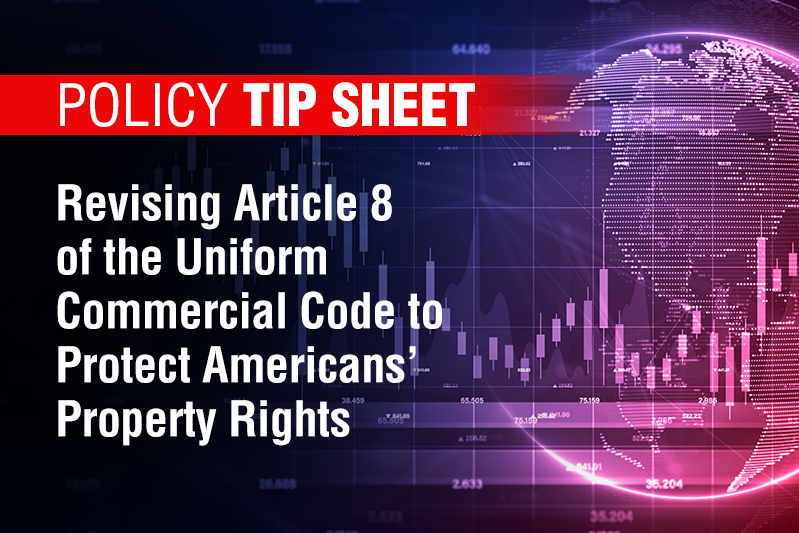(Click here to read the full Policy Tip Sheet in PDF form.)
Important provisions in Article 8 of the Uniform Commercial Code (UCC) contain highly problematic elements that undermine Americans’ individual rights and threaten the stability of the U.S. economy. This Tip Sheet will provide a brief description of those troubling areas of the UCC and propose a set of related concrete policy solutions for lawmakers.
The UCC was created in the mid twentieth century by the Uniform Law Commission—an influential organization of practicing lawyers, judges, legislators, legislative staff, and law professors. The ULC frequently proposes updates and revisions to the UCC to this day, and it, along with the American Law Institute, is the driving force behind the vast majority of UCC legislative proposals. According to its website, the ULC “provides states with non-partisan, well-conceived and well-drafted legislations that brings clarity and stability to critical areas of state statutory law.”1
The ULC notes that the Uniform Commercial Code “is a comprehensive set of laws governing all commercial transactions in the United States.” The ULC further explains, “It is not a federal law, but a uniformly adopted state law. Uniformity of law is essential in this area for the interstate transaction of business. Because the UCC has been universally adopted, businesses can enter into contracts with confidence that the terms will be enforced in the same way by the courts of every American jurisdiction. … For this reason, the UCC has been called ‘the backbone of American commerce.’”2
As the ULC has rightly explained, the UCC is a vital set of laws that allows for commercial activity to be conducted in a relatively cohesive manner across all 50 states. Because commercial activity and technology are always changing, it is prudent for lawmakers to occasionally update the UCC.
Unfortunately, because the UCC is dense and complicated, very few people and organizations understand it. Over the past few decades, the ULC and others have taken advantage of this confusion by implementing changes to the UCC that few people in the public fully grasp or even know about. Furthermore, because the ULC has a longstanding positive reputation among state legislators, policymakers have made these changes to the UCC that have been proposed by the ULC without fully understanding the ramifications of their decisions.
Perhaps the most egregious example of this relates to amendments made to UCC Article 8, which focuses on investment securities. These amendments, which were passed in the 1990s, have abrogated Americans’ property rights to their own securities, including but not limited to those contained within retirement accounts, such as 401(k) and IRA accounts.
Article 8: Property Rights
In 1994, the Uniform Law Commission established a drafting committee to revise UCC Article 8. The ULC revised Article 8 and then presented its amendments to state legislatures. Over the next several years, lawmakers in all 50 states–as well as the District of Columbia and all U.S. territories–passed those important amendments, fundamentally transforming property rights related to investment securities, including stocks, bonds, exchange-traded funds, and most investments included in retirement accounts.
The stated rationale for the revisions was that the previous version of UCC Article 8 did not address the rapid evolution occurring in the financial sector from paper stock and bond certificates to digital (uncertificated) securities. This transition began in earnest in the 1980s. Moreover, the lead drafter of the 1994 UCC revisions stated that the primary motivation behind the work was to prepare for a potential collapse of U.S. financial markets.3
Under the revised UCC Article 8, individuals, organizations, or businesses that purchase a security investment are not the owner of the security. Instead, they become the owner of a securities contract called a “security entitlement.”4 The revisions to Article 8 shifted ownership to the purchaser’s broker, or, more commonly, to the organizations holding securities in trust for brokers, bankers, and other financial institutions, the most prominent of which in the United States is the Depository Trust Company (DTC).
The DTC is owned by the Depository Trust & Clearing Corporation (DTCC), which is, in turn, owned by the participants of its various subsidiaries including the DTC. DTCC’s participants are primarily banks, brokers, and other financial institutions. The DTC holds 1.4 million securities valued at $87.1 trillion, making it one of the most important financial institutions in the world today.5
The DTC holds securities in pools, rather than registering each security to a specific purchaser. By allowing ownership to shift to large financial institutions, especially the DTC, and permitting securities to be pooled together, the UCC and federal government have empowered brokers and other institutions to use other people’s investments in a variety of financial arrangements, including short sales, that otherwise would not be possible or difficult if the original purchasers maintained ownership of their investments.
Ultimately, the changes to UCC Article 8 have helped guarantee that the protected creditors of securities intermediaries are given priority ownership to security entitlements when intermediaries, such as popular stockbrokers, use customer assets as collateral. What this means is that if an individual investor’s broker were to go bankrupt, the broker’s secured creditors— large financial institutions—would be given priority over individual investors who made the mistake of thinking that the security they bought and paid for belongs to them. In such a situation, Article 8 ensures that the investor would become an unsecured creditor, with the investor’s claims to their securities falling at the back of the line in an insolvency proceeding. That means that in the event of a widescale financial crash, thousands or even millions of investors could lose a significant portion of their assets to secured creditors.
Further, there is simply nowhere near enough collateral to cover all the debt and other obligations currently spread throughout the financial markets, so the risks to individuals posed by Article 8 are real and dire.
In order to alleviate concerns about investment markets, Congress created the Securities Investor Protection Corporation (SIPC) in 1970.6 In the event a broker goes bankrupt, the SIPC would, under most situations, bail out investors up to $500,000 in securities and cash, although the limit for cash is $250,000.7 Unfortunately, the SIPC has been vastly underfunded for years and could not come even remotely close to covering investor losses in the event of a widespread market failure. At the end of 2021, the SIPC fund had approximately $4 billion in assets, a tiny fraction of what would be required in a significant crash.8 5 For example, Fidelity Investments alone has approximately $12.6 trillion in assets under management.9
A review of the current UCC, contemporaneous writings by law professors,10 the ULC drafting committee’s comments,11 and a simultaneously enlightening and concerning exchange between the U.S. Federal Reserve Bank of New York and the European Commission’s Legal Certainty Group12 clearly indicate that the threat posed to investment securities by Article 8 is real.
Further, there has already been an instance in which the changes to UCC Article 8 were used as the legal basis for the taking of investors’ securities; these legal decisions have cemented into law the assertion that large financial institutions have priority over customer assets.
When Lehman Brothers filed for bankruptcy during the 2008 financial crisis, one of its primary lenders was JP Morgan Chase Bank. A subsidiary of JP Morgan Chase was Lehman’s custodian, of both Lehman’s own assets and the assets of Lehman’s customers. As custodian, JP Morgan Chase had control of Lehman’s assets, and as lender, JP Morgan Chase had a security interest in Lehman’s assets. As a result of the changes to UCC Article 8—as well as a 2005 change to federal bankruptcy law—JP Morgan Chase was able to freeze Lehman’s institutional accounts as collateral for the loans that Lehman could no longer pay.13
If the financial markets continue to operate without significant trouble, the changes made to Article 8 will likely have little impact for individual investors. However, if there were a large crash in the financial markets, investors’ securities could be taken in the aftermath, all to the benefit of too-big-to-fail financial institutions.
Allowing massive institutions, many of which are worth more than $100 billion, to have priority over security entitlements belonging to individual investors creates massive distortions in the marketplace and severely violates property rights. But even if this were not the case, an important question for policymakers remains: is a system truly worth saving if it would happily sacrifice individual investors’ wealth to save the world’s most powerful banks?
Policy Recommendations
First, state legislators could alter UCC Article 8 to ensure that individual investors have ownership priority in the evet that a securities intermediary goes bankrupt.
Second, state legislators could alter UCC Article 8 so that disputes with financial institutions are resolved in the jurisdiction of the individual investor, rather than the state of the broker-dealer, custodian, or clearing corporation. Currently, jurisdiction is based on the location of the applicable financial institution, not the individual investor.
Third, state legislators could create a study committee to put the entire Uniform Commercial Code under a microscope and discover other problematic elements of the statute.
Endnotes
1 Uniform Law Commission, “About Us,” uniformlaws.org, accessed September 25, 2023, https://www.uniformlaws.org/ aboutulc/overview
2 Uniform Law Commission, “Uniform Commercial Code,” uniformlaws.org, accessed September 26, 2023, https://www. uniformlaws.org/acts/ucc
3 James S. Rogers, “Policy Perspectives on Revised U.C.C. Article 8,” UCLA Law Review 1431, 1996, accessed from Boston College Law School Faculty Papers, https://lira.bc.edu/work/sc/81b6ffe2-96c3-4087-b991-c70aaa870a47
4 Uniform Law Commission, UCC Article 8, Investment Securities, uniformlaws.org, accessed January 10, 2024, https:// www.uniformlaws.org/committees/community-home?CommunityKey=f93a92b2-020f-4bfa-880b-5f80d24d018d
5 “About DTCC,” dtcc.com, last accessed February 22, 2024, https://www.dtcc.com/about/businesses-and-subsidiaries/ dtc
6 SIPC.org, accessed February 22, 2024, https://www.sipc.org/
7 SIPC.org, “Mission,” accessed February 22, 2024, https://www.sipc.org/about-sipc/sipc-mission 8 SIPC.org, “The SIPC Fund,” accessed February 16, 2024, https://www.sipc.org/about-sipc/the-sipc-fund 9 Fidelity.com, “By the Numbers,” accessed February 22, 2024, https://www.fidelity.com/about-fidelity/our-company
10 For a selection of these writings, see: Francis J. Facciolo, “Father Knows Best: Revised Article 8 and the Individual Investor,” Florida State University Law Review, Volume 27, Issue 616, 2000, https://www.stjohns.edu/sites/default/ files/uploads/facciolo-father-knows-best.pdf; Russell A. Hakes, “UCC Article 8: Will the Indirect Holding of Securities Survive the Light of Day,” Loyola of Los Angeles Law Review, Volume 35, Issue 3, April 2002, https://digitalcommons. lmu.edu/cgi/viewcontent.cgi?article=2318&context=llr; Kathleen Patchel, “Interest Group Politics, Federalism, and the Uniform Law Process: Some Lessons from the Uniform Commercial Code,” Minnesota Law Review, Volume 78, 1993, https://scholarship.law.umn.edu/cgi/viewcontent.cgi?article=2733&context=mlr
11 The American Law Institute and the National Conference of Commissioners on Uniform State Laws, U.C.C. – Article 8 – Investment Securities (Revised 1994), Published by Cornell University Law School, Legal Information Institute, January 2003, https://assistingvessels.files.wordpress.com/2012/05/ucc8_investment-securities.pdf
12 Federal Reserve Bank of New York, “EU Clearing and Settlement, Legal Certainty Group, Questionnaire,” March 6, 2006, https://ia802601.us.archive.org/32/items/ec-clearing-questionnaire/EuCommission2005a.pdf
13 It is important to note that no investors actually lost their principal in this instance. Lehman’s retail accounts were sold off to a different broker, but Lehman’s institutional accounts were frozen by JP Morgan Chase. Ultimately, those institutional accounts were able to be reclaimed because of a rebound in the financial markets, though they had been held for more than five years, based on the new UCC Article 8 changes and the “safe harbor” provisions added to federal bankruptcy code in 2005. For more information, see: United States Bankruptcy Court, Southern District of New York, Lehman Brothers Holdings Inc., et al., v. Debtors, Report of Anton R. Valukas, Examiner, Volume 5 of 9, March 11, 2010, accessed from Jenner & Block, https://www.jenner.com/en/news-insights/news/lehman-brothers holdingsinc-chapter-11-proceedings-examiner-s-report; see also: United States Bankruptcy Court, Southern District of New York, Lehman Brothers Holdings Inc., et al., v. JPMorgan Chase Bank, N.A., “Memorandum Decision Granting In Part and Denying In Part Motion to Dismiss by Defendant JPMorgan Chase Bank, N.A.,” April 19, 2012, https://www. nysb.uscourts.gov/sites/default/files/opinions/198038_134_opinion.pdf





